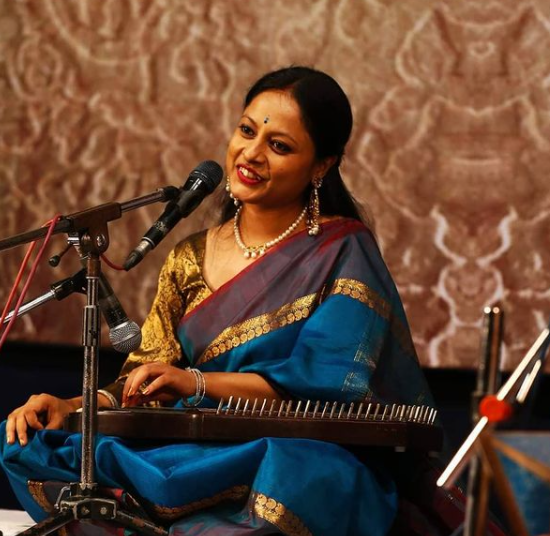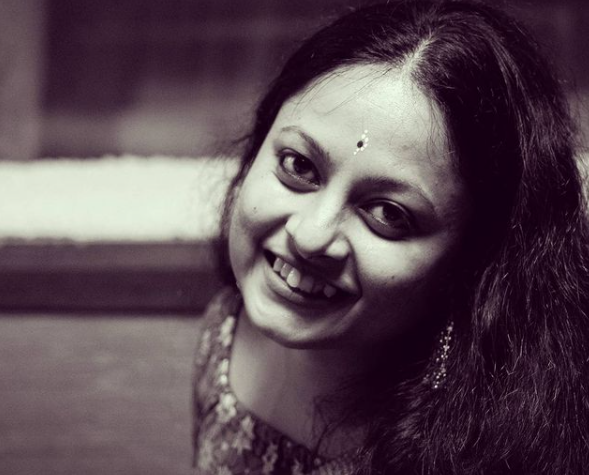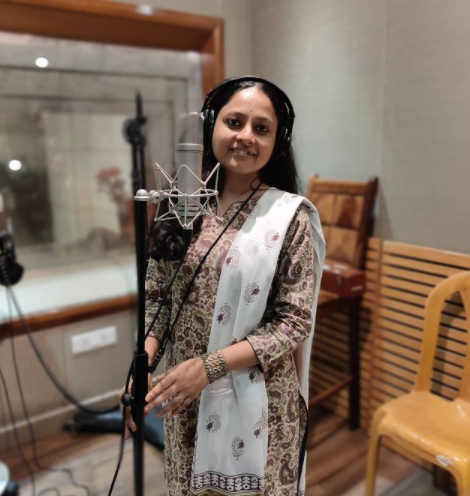A Raconteur, some raagas and Ronkini Gupta
In The Slow Cafe, Neelesh Misra and singer Ronkini Gupta speak about music, life, challenges, what achievement means, and the joy of progressing from C to C sharp.

Is this a conversation or a concert or both? Listening to Neelesh Misra speaking to Hindustani classical and playback singer Ronkini Gupta in The Slow Cafe was difficult to slot. Misra provided a gentle nudge and Gupta’s voice soared in response, creating ripples of musical notes, her face mirroring what her soul felt. It almost felt she and her music were one.
Listeners of film music will remember Gupta from ‘Rafu’ in Vidya Balan-starrer Tumhari Sulu and the haunting melodies ‘Chaav Laaga’ and ‘Tu Hi Agam’ in the Varun Dhawan-Anushka Sharma-starrer Sui Dhaaga.
Gupta, who was raised in Jamshedpur when it was still a part of Bihar, moved to Mumbai when she was 18. Those days, Mumbai was the place to head to if one wanted to pursue a career in music. Till then, Gupta, who specialises in Khayal, had never seen music as a career. “For the longest time, if anyone asked me what I wanted to become, my reply would be nothing. I’ve always taken one day at a time. Even now, if you ask me, I don’t know what I am or would like to be,” said Gupta.
Also Read: Inspirational Tales about the bravehearts of CRPF, soon on The Slow App
The singer’s definition of music was immensely moving, and came from a lived experience. “It was introduced to me as a hobby, in due course it became a discipline, and finally my mode of being. That was progression — I realised I could not live without it,” said Gupta. “It does something to people, transforms them. Riyaaz or practice brings in deep discipline. During different phases, I’ve had different realisations. I think it has impacted my analysis, my expression, it has offered perspectives, and, of course, there’s the pure joy and sheer happiness that music gives,” she said.

What does it feel like to be immersed in the world of music, and why is the kind of time it takes necessary? “You need to give it that time and importance. The rest of the world might not understand sadhana (practice) and its impact, but it makes you a better person, changes how you see the world,” Gupta said.
The singer is also a great word chiseller. “You learn something twenty five years ago and keep singing it. But, with time, you know how to improve some portions, how to embellish it. That changes the game. It’s like an addiction, an obsession. You want to sing but make it different. It’s almost playful,” said Gupta, who broke into a Hansdhwani creation. “The raag means two things — the call of the swan or the call of the soul,” she informed.
Gupta was at her candid best when speaking of the effect music had on her. “You are responding to that emotion at that point of time. Many things might be happening at that time, but it’s fun and, after years, I got to understand this energy,” Gupta said, and sang a Merukhand, a cluster of notes, following a request by a listener. “The structure is the same — from one cluster of notes you move to the next and then the next.” she said, literally building a musical castle with her description.
Also read: Some songs change our life. Some of our songs change others’ lives: Swanand Kirkire
How does one define achievement and challenge in today’s world, asked Misra. “This is important to discuss in today’s digital world where gratification and validation is immediate. There’s success, fame, things go viral. Success is correlated with achievement. But, in classical music, this is an internal exercise. Achievement could be something as simple, yet big as ‘till yesterday I sang in C, today I sang in C Sharp’,” Gupta said.
Misra said this seemed like what a mathematician would do if unable to solve a problem — wake up at 3 am. To this Gupta nodded with the experience of someone who seems to have done this multiple times.
In music, achievement is not a stop but a journey. “If you don’t regularly practice, it can go missing. This finesse and finetuning requires practice. You have to keep it safe,” she said.

Is music the result of a good voice or practice, asked Misra. “Voice is a gift, as is timbre and tone, and your understanding of them. Being attracted naturally to music is a gift. And you end up being a different person on a daily basis, because it means life and earth to you.”
Also Read:They wanted me to be Tina Turner. I liked Teejan Bai: Sona Mohapatra
Effortlessness comes with effort
Effortlessness comes in when you feel one with the music. “Technique is important, you grow with it. But, once expression takes over, technique has to take the back seat,” said Gupta, treating listeners to a bandish — Kanha Mora — she had composed in Roopak Taal in seven beats.
What is the joy of learning young? “When you are young, your takeaway is a lot and your degree of takeaway is large,” said Gupta, who stuck to her path despite tremendous pressure from home.

Misra asked her how she handled the pressure of the world outside — for the world, music is a passion, but they would ask: What about engineering, what about medicine. “How did you handle them?” “Sansaarik pulls,” laughed Gupta. “My family loved music but no one else before me had pursued it as a career. The focus was on studies, since my father was a civil engineer and mother a teacher. While in college, I won Saregamapa [World Series], and that told me I was on the right track.
Does Gupta believe in destiny? “It is faith in the supreme power, and in music and dance we are always trying to find out if there’s a supreme, and if it’s there, how do I get there,” said Gupta, breaking in two popular Hindi film songs written by Misra — Jadu Hai Nasha Hai and Chalo Tumko Lekar from Jism. “I know this by rote. I’ve sung Jadu two thousand times as part of a Broadway musical show, So no, I’m not exaggerating,” laughed Gupta.

